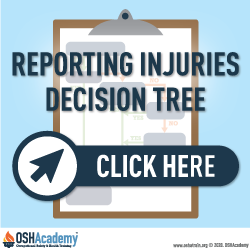Reporting Requirements
What am I required to report?
All employers under OSHA jurisdiction must report work-related fatalities, in-patient hospitalizations, amputations, and losses of an eye to OSHA, even if they are exempt from routinely keeping OSHA records.
Employers have to report the following events to OSHA:
- All work-related fatalities
- All work-related in-patient hospitalizations of one or more employees. OSHA defines in-patient hospitalization as a formal admission to the in-patient service of a hospital or clinic for care or treatment.
- All work-related amputations. An amputation is the traumatic loss of a limb or other external body part. Amputations include a part, such as a limb or appendage, that has been severed, cut off, amputated (either completely or partially); fingertip amputations with or without bone loss; medical amputations resulting from irreparable damage; amputations of body parts that have since been reattached. Amputations do not include avulsions (tissue torn away from the body), enucleations (removal of the eyeball), deglovings (skin torn away from the underlying tissue), scalpings (removal of the scalp), severed ears, or broken or chipped teeth.
- All work-related losses of an eye
When do I have to report work-related fatalities, injuries, and illnesses?
Employers must report work-related fatalities within 8 hours of finding out about it.
For any in-patient hospitalization, amputation, or eye loss, employers must report the incident within 24 hours of learning about it.
Only fatalities occurring within 30 days of the work-related incident must be reported to OSHA. For an inpatient hospitalization, amputation or loss of an eye, the incident must be reported to OSHA only if they occur within 24 hours of the work-related incident.
Knowledge Check Choose the best answer for the question.
5-1. After you learn about an in-patient hospitalization, amputation, or eye loss, you must report the incident _____.
You forgot to answer the question!

